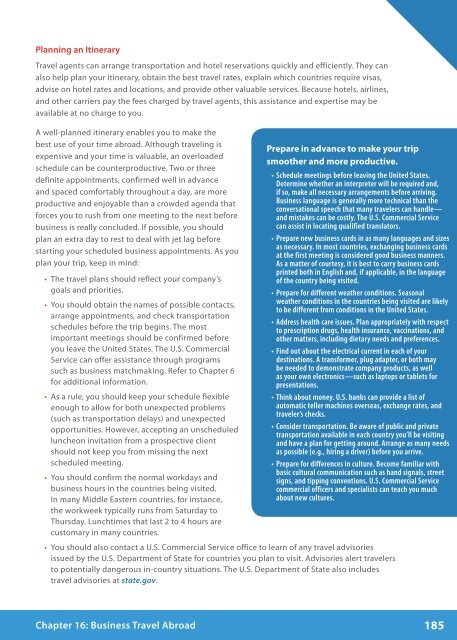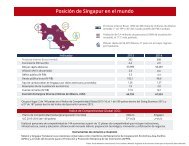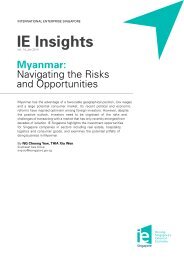basic-guide-to-exporting_Latest_eg_main_086196
basic-guide-to-exporting_Latest_eg_main_086196
basic-guide-to-exporting_Latest_eg_main_086196
Create successful ePaper yourself
Turn your PDF publications into a flip-book with our unique Google optimized e-Paper software.
Planning an ItineraryTravel agents can arrange transportation and hotel reservations quickly and efficiently. They canalso help plan your itinerary, obtain the best travel rates, explain which countries require visas,advise on hotel rates and locations, and provide other valuable services. Because hotels, airlines,and other carriers pay the fees charged by travel agents, this assistance and expertise may beavailable at no charge <strong>to</strong> you.A well-planned itinerary enables you <strong>to</strong> make thebest use of your time abroad. Although traveling isexpensive and your time is valuable, an overloadedschedule can be counterproductive. Two or threedefinite appointments, confirmed well in advanceand spaced comfortably throughout a day, are moreproductive and enjoyable than a crowded agenda thatforces you <strong>to</strong> rush from one meeting <strong>to</strong> the next beforebusiness is really concluded. If possible, you shouldplan an extra day <strong>to</strong> rest <strong>to</strong> deal with jet lag beforestarting your scheduled business appointments. As youplan your trip, keep in mind:• The travel plans should reflect your company’sgoals and priorities.• You should obtain the names of possible contacts,arrange appointments, and check transportationschedules before the trip b<strong>eg</strong>ins. The mostimportant meetings should be confirmed beforeyou leave the United States. The U.S. CommercialService can offer assistance through programssuch as business matchmaking. Refer <strong>to</strong> Chapter 6for additional information.• As a rule, you should keep your schedule flexibleenough <strong>to</strong> allow for both unexpected problems(such as transportation delays) and unexpectedopportunities. However, accepting an unscheduledluncheon invitation from a prospective clientshould not keep you from missing the nextscheduled meeting.• You should confirm the normal workdays andbusiness hours in the countries being visited.In many Middle Eastern countries, for instance,the workweek typically runs from Saturday <strong>to</strong>Thursday. Lunchtimes that last 2 <strong>to</strong> 4 hours arecus<strong>to</strong>mary in many countries.Prepare in advance <strong>to</strong> make your tripsmoother and more productive.• Schedule meetings before leaving the United States.Determine whether an interpreter will be required and,if so, make all necessary arrangements before arriving.Business language is generally more technical than theconversational speech that many travelers can handle—and mistakes can be costly. The U.S. Commercial Servicecan assist in locating qualified transla<strong>to</strong>rs.• Prepare new business cards in as many languages and sizesas necessary. In most countries, exchanging business cardsat the first meeting is considered good business manners.As a matter of courtesy, it is best <strong>to</strong> carry business cardsprinted both in English and, if applicable, in the languageof the country being visited.• Prepare for different weather conditions. Seasonalweather conditions in the countries being visited are likely<strong>to</strong> be different from conditions in the United States.• Address health care issues. Plan appropriately with respect<strong>to</strong> prescription drugs, health insurance, vaccinations, andother matters, including dietary needs and preferences.• Find out about the electrical current in each of yourdestinations. A transformer, plug adapter, or both maybe needed <strong>to</strong> demonstrate company products, as wellas your own electronics—such as lap<strong>to</strong>ps or tablets forpresentations.• Think about money. U.S. banks can provide a list ofau<strong>to</strong>matic teller machines overseas, exchange rates, andtraveler’s checks.• Consider transportation. Be aware of public and privatetransportation available in each country you’ll be visitingand have a plan for getting around. Arrange as many needsas possible (e.g., hiring a driver) before you arrive.• Prepare for differences in culture. Become familiar with<strong>basic</strong> cultural communication such as hand signals, streetsigns, and tipping conventions. U.S. Commercial Servicecommercial officers and specialists can teach you muchabout new cultures.• You should also contact a U.S. Commercial Service office <strong>to</strong> learn of any travel advisoriesissued by the U.S. Department of State for countries you plan <strong>to</strong> visit. Advisories alert travelers<strong>to</strong> potentially dangerous in-country situations. The U.S. Department of State also includestravel advisories at state.gov.Chapter 16: Business Travel Abroad185





